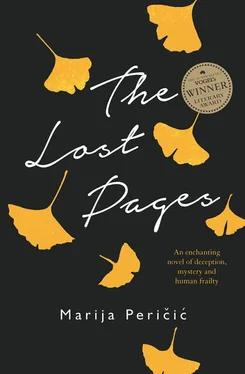On this particular morning I was preoccupied more than usual with Anja’s absence. I was certain that she was back in Prague. The last two times that I had stationed myself outside the house, there had been distinct movement within the apartment. I was sure of it. The arrangements of the curtain over the window had also changed. The concierge continued to dismiss me, but I thought I could discern some shift in his expression, another possible signal of the Železnýs’ return.
The idea that Anja might be there but that I could not reach her was maddening, and made me feverish and dizzy. Was the concierge barring me from the apartment out of spite? I regretted calling on Anja so persistently; the concierge perhaps felt he was protecting her from a nuisance, or perhaps even violence. For the first time Klopstock seemed a sympathetic figure to me, and it was with shame that I noted our similarities.
I was interrupted in my musings by a knock at the office door. No one had ever disturbed me at this hour before. It was disorienting. There was a long silence, and I began to wonder if I might have imagined the knock, or if the sound had come from somewhere else. But then it came again. I felt irrationally fearful, as if I were about to be visited by some supernatural presence.
‘Come in,’ I said.
Theodor came into the room. He was the last person I was expecting. I leaned back in the chair, relieved, and waved him to a chair, but he declined with a shake of his head. It was then I saw his angry face.
‘Three hundred and fifty-three crowns and twenty-two heller,’ he said. He had not taken off his hat. He stood in the centre of the room with his arms folded. He looked furious but also, I thought, confused.
‘Oh yes,’ I said. ‘The cheque.’ He must have spoken to Franz about it. I was thinking fast. The possibility of claiming to have lost it flashed through my mind, but I could not remember if I had signed anything at the bank when collecting it, and Theodor might have checked. Perhaps the best thing was just to admit it. ‘Yes, that was for expenses, isn’t that right?’
‘The cheque was for Franz,’ said Theodor.
‘Yes, but you had it made out to cash, and I thought, well, it must be expenses.’ My voice hung in the air. ‘Karlsbad, all those museums. And, you know, I was the one who wrote the whole thing up. Every word!’
There was a long silence. I tried to bring my eyes to Theodor’s face.
‘The cheque,’ said Theodor again, slower this time, ‘was for Franz.’
I could not meet his eye. ‘I see. Yes. It was a misunderstanding. You have my apologies.’
‘Just what exactly is your relationship to Franz?’ Theodor asked.
I was stunned, and did not know how to answer. To say, He is my rival and I wish to destroy him , was not a possible response, although it would have been the honest one. But Theodor was a man of heightened sensitivity and had no doubt already intuited my true feelings about Franz.
‘We are not so close,’ I managed eventually.
Theodor nodded, as though he was satisfied with this. ‘Please return my money,’ he said. ‘The exact sum.’
I assured him that I would and he left without saying goodbye. I picked up my cup of coffee, now almost cold, and saw that my hands were trembling. I felt ashamed now of having taken the money. Or, to be accurate, I was ashamed not of having taken it but of having been discovered. But, when I considered of all my dishonesties in the past months, taking the cheque seemed to me to be the most harmless. If I had to be discovered in one dishonesty, this was by far the best. Yet I did not feel reassured. Something about Theodor’s manner worried me.
It was still quite early, so I took the morning’s newspaper from my briefcase, hoping to distract myself. I skimmed through the political pages, my eyes moving superficially over the surface of the paper, taking nothing in. My thoughts circled constantly from Anja to Klopstock to Franz. Franz had become like a phantom to me, a nightmare figure. I saw him as an insatiably greedy monster, sucking up everything around him, all the women, adulation and attention, like someone emptying a glass through a straw. In my imagination he had become swollen, grotesque, with long, skinny limbs like a spider. I pictured him and Anja sitting in our little room at the Hotel Kroh, laughing together over my letters the way that Franz and I had laughed over Klopstock’s. They would take it in turns to read sections of the letters out, imitating my voice, and fall about the room with mirthful tears squeezing out of their clenched eyelids.
The thought agitated me to the point where it became difficult to control my breathing. My clothing, damp with sweat, lay cold against my flesh. I could hear the sound of my heart as an external thing, as if it were an object in the room. Panic rose through my chest, and the connections in the world began to float, loose and elastic. To anchor myself, I riveted my eyes to one phrase in the newspaper—‘reliable sources brought to our attention’—and read it over and over, mouthing the words. My hands clamped onto the edge of the desk. When I dared to let go, I took a hurried swallow of coffee, which rolled down my throat like a stone. I turned the page, pretending to myself that I was feeling normal again.
Then I saw Franz’s face looking up at me. It was certainly Franz, but his face looked different to me now. His eyes, below his neatly combed hair, were like large black pools and they burned into mine. They seemed to regard me and dismiss me for some wrongdoing. His lips curled, about to speak. I stared at his face. It seemed to rise off the page, expand to an enormous size and engulf me.
Wildly, my eyes seized on the words of the headline: HAS THE SON ECLIPSED THE FATHER? My eyes travelled down the columns of print and there, at the bottom of the page, was a photograph of me, small and grainy, barely recognisable. I gripped the desk again, but this time I could not prevent the room from sliding away from me. [18] There is a newspaper clipping included here, measuring approximately five by seven centimetres, which on one side contains part of a photograph of an unknown face, and on the other an advertisement for Gottlieb coffee.
I became aware of nearby motion and a voice inside my head saying my name. Other voices came to me, and I struggled to open my eyes, which seemed loaded with heavy weights. I saw some yellow object floating on a white ground, and it took me a moment to recognise it as the ceiling lamp. I shifted my eyes to the left, and Stephanie came into view, talking to a man I vaguely recognised as being somehow connected with the post office. They were both looking at me intently and they tried to hoist me into a sitting position. My body became rigid at the touch of their hands. I hated to be touched; even to shake hands cost me an effort.
I felt quite normal, and I wanted more than anything for everyone to leave my office, to be left alone. But they insisted on staying and kept me sitting on the floor, propped up against the desk. There was a soft knock at the door, and it opened to admit a strange man carrying a case: the doctor whom they had called.
He did not ask for my colleagues to leave the room, but examined me in their presence. He declared my vital signs to be normal, but took the weakness in my legs as a symptom of the fall. My voice quavered when I was forced to identify myself as a cripple. At last he left, along with the man from the post office, and I was allowed to get up from the floor. But Stephanie still lingered and soon Jelen was at the door, his face grave. He sent me home for the day.
When I left the building I collided with a wall of heat that had already built up, though it was still quite early. I began to sweat as soon as I stepped away from the shade of the doorway. After a few blocks, I stopped at a café, more out of the need for a cool place than the need for a drink, and I ordered tea only because it was still too early for beer. I tried to forget the article I had read, but my thoughts circled unendingly over Kafka, Anja, Klopstock, Theodor, but could not fix firmly on any one. The scale of my problems was suddenly too large to contemplate, and my mind shied from the task. It was useless to try to concentrate. What I would have most liked to do was to go for a walk in the country to clear my head, but the day was much too hot for that. I left the café without drinking my tea and walked home.
Читать дальше












